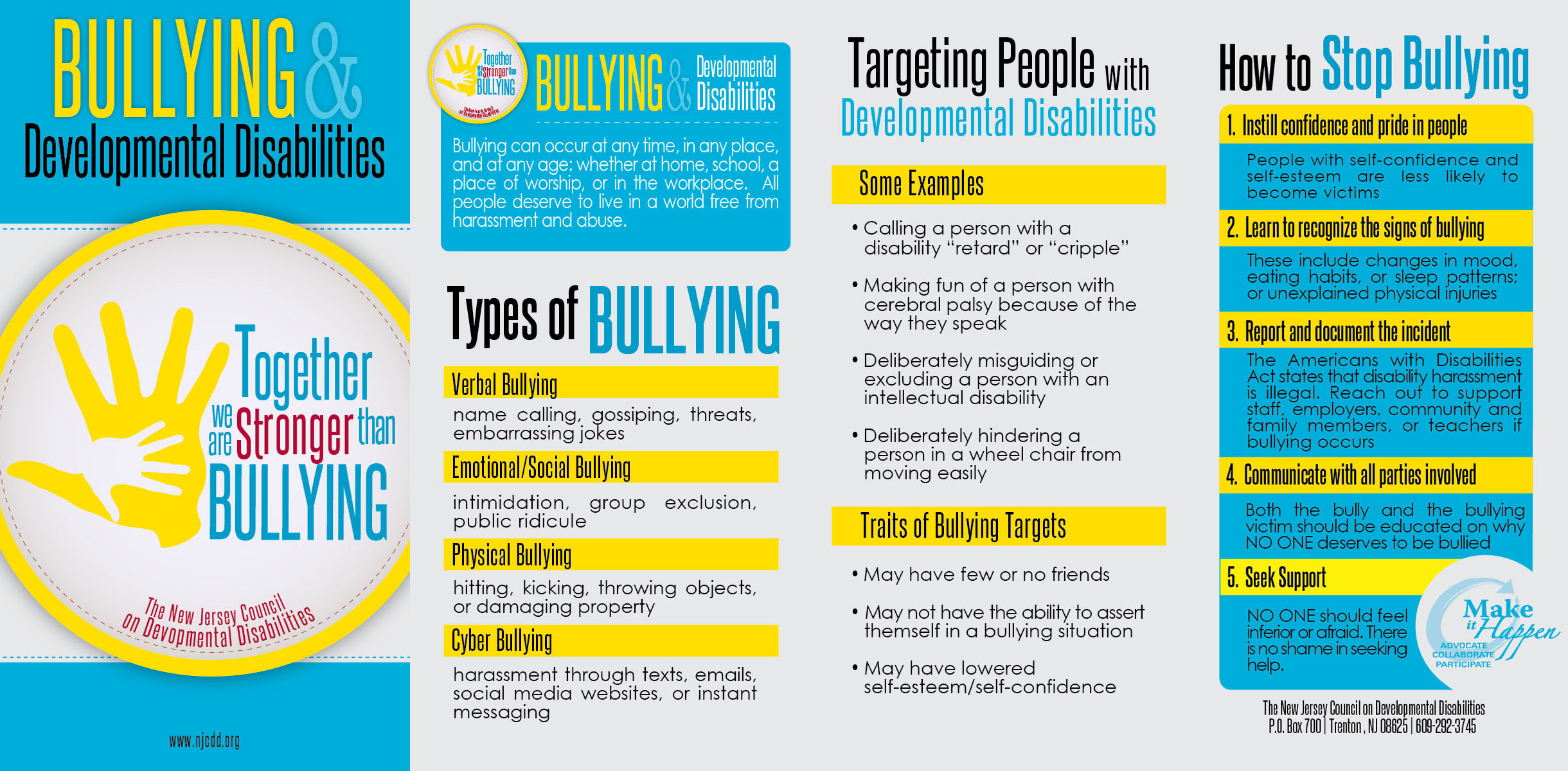Bullying can occur at any time, in any place, and at any age; whether at home, school, a place of worship, or in the workplace. All people deserve to live in a world free from harassment and abuse.
Bullying is intentional. The individual does not knowingly provoke the bully and may have made it clear that the behavior is not welcome. What is Bullying?
Bullying behavior is often repetitive. Although it can take place in a single incident, bullying is generally carried out repeatedly over time.
Bullying involves hurtful acts, words, or other behavior. Bullying is an oppressive or negative act intended to hurt somebody else.
Bullying involves a real or perceived imbalance of power. Power in this instance can be defined as physical strength, social status, or intimidating behavior.
Some examples might include:
A person with cerebral palsy being made fun of due to the way they speak;
A person with intellectual disability having lunches stolen from them;
Calling a person with a disability “retard” or “cripple;”
Tampering with a person’s wheelchair or intentionally putting up barriers, making movement around space difficult; and
Intentionally bumping into a people with mobility and/or visual impairments
While anyone can be bullied, targets of bullying tend to have one or more of these common traits:
They might give a vulnerable response to being bullied;
They have few or no friends;
They may not have the ability to assert themselves in a bullying situation; and,
They can have lowered self-esteem and self-confidence
Learn to recognize the signs of bullying. Watch for changes in mood, eating habits, and sleeping patterns, or signs of physical abuse.
Instill confidence and pride in abilities and disabilities. Individuals with self-esteem and self-confidence are less likely to be victimized by bullies and will respond more effectively when faced with social pressures.
Communicate with all parties involved. If you believe bullying is taking place, contact teachers, family members, and staff of individuals who are involved. Put your concerns in writing. Both individuals who are bullied and those that bully are equally in need of education.
Request an Individualized Education Program (IEP) team meeting if you believe bullying of your child is based on his or her disability and is interfering with learning. This form of intentional harm is considered “disability harassment” under Section 504 of the Rehabilitation Act of 1973 and under Title II of the Americans with Disabilities Act of 1990. Disability harassment is illegal.
Seek support. Bullying is serious and harmful. Let the victim know that no one has the right to make them feel inferior or afraid. Help them to identify all available supports and let them know there is no shame in seeking help.
Verbal Bullying: includes teasing, gossiping about another, name-calling, embarrassing jokes, and actual threats.
Emotional/Social Bullying: generally involves the assertion of social power to cause pain or exclude the target from the social crowd. Often done in a group, social/emotional bullying can be done through gossip, public ridicule, or intentional exclusion from social events
Physical Bullying: involves actions like hitting, kicking, pushing, throwing objects, or damaging property. It can also involve pretending or threatening to inflict harm, making the target feel uneasy.
Cyber Bullying: harassment through electronic means, such as instant messaging, texting, e-mails, or social media postings.
Request an Anti-Bullying presentation
The NJCDD is available to visit schools and community groups to address issues surrounding the Anti-Bullying and other forms of bullying. Hundreds of students across the state have already attended these insightful and engaging presentations lets to put an end to the bullying.
E-mail Anti-Bullying presenter frank.latham@njcdd.org Frank Latham, to find out more about our Anti-Bully presentations, and to schedule one for your school or community group.
Request Anti-Bullying Materials
The NJCDD offers buttons, bumper stickers, posters, t-shirts, and more to promote the Anti-Bullying campaign and to bring an end to bullying.
Email NJCDD njcdd@njcdd.org to request Anti-Bullying materials.

